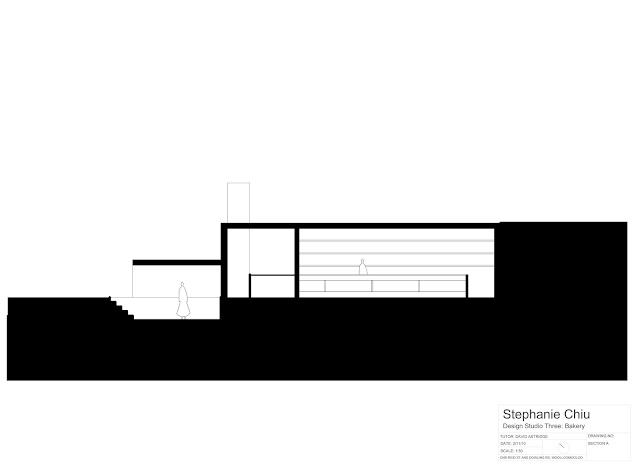Wednesday, March 14, 2012
Tuesday, March 6, 2012
arch1201. project1 - Antonio Carlos Siza House
Antonio Carlos Siza House, 1978
Alvaro Siza
Santo Tirso, Portugal



These analytical drawings explore the public and private spaces, how they are defined by the amount of light that envelopes it. Public spaces are classified as either intimate or normal public spaces determined by its ceiling height where a compressed space is intimate. The drawings also subtly explore the circulation of the house, first being presented with a view of the living room (joining room between private and public) from the entrance and then a choice between the public rooms (kitchen, dining room) or private rooms (bedrooms).
Alvaro Siza
Santo Tirso, Portugal
There were discrepancies between published plans and the built house.
This was discovered with the photographs of the house. The plan I drew
up represents what i understand and can see from the photographs. The sections show the main structural systems in the house.


These drawing explore the two major axis which is the starting points of
the structuring of rooms within the house (ie/ separation between
public and private) and how the diagonal axis creates a connection
between the split, bringing private and public back together yet
separate through the courtyard, the heart of the house.

These analytical drawings explore the public and private spaces, how they are defined by the amount of light that envelopes it. Public spaces are classified as either intimate or normal public spaces determined by its ceiling height where a compressed space is intimate. The drawings also subtly explore the circulation of the house, first being presented with a view of the living room (joining room between private and public) from the entrance and then a choice between the public rooms (kitchen, dining room) or private rooms (bedrooms).
Tuesday, January 11, 2011
arch0006. assignment1 - the thought and behaviour paradigm
The Thought and Behaviour Paradigm explores the seemingly ironic nature between the human mind and its simple thoughts, and consequent complex behaviours. For instance, an ant has a goal to return home. Seemingly, on observation, ants travel a path that is ever changing depending on its environment and the obstacles within it.
The Thought and Behaviour Paradigm looks into the thin connection of the mind to the body and contrastingly the support of the body for the mind expressed in the columns holding the head up. The dynamic character of the world around us and our shifting behaviour to it is conveyed in the waterfall of sand and the three arms representing the movement of an arm with the sand, and also the rotatable arm.

Monday, January 10, 2011
Tuesday, November 2, 2010
Tuesday, October 26, 2010
arch1142. rendering - final
Subscribe to:
Comments (Atom)




























